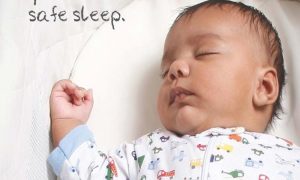Safe Sleep Recommendations Necessary for the First Year of Life
Resource Type
Family Resources
Resource Topic
Share this post


Nutrition, brain development, basic care and cognitive growth are just a few topics on the long list to consider when taking care of a new baby. Sleep is another area of focus that is often brought up when a baby is born. Anytime we turn on the TV, we are bombarded with images of infants sleeping on their parent’s chests, in cribs with bumper pads and babies sleeping in bed with families. These unsafe sleep environments are just a fraction of what we confront at Healthy Mothers Healthy Babies Coalition of Broward County. The importance of placing infants to sleep Alone, on their Back and in an empty Crib is overwhelming. There are many reasons why it is so important that we not only follow these rules with our infants but spread the safe sleep message to the community.
Why does my baby need to be placed on his back for each and every sleep?
It is important for infants to be placed on the back for many reasons. The most significant has to deal with the infant’s ability to wake up if there’s a problem. This is otherwise known as the arousal threshold. When a baby is placed on his stomach, his hands and feet are grounded on the mattress and his body temperature is elevated due to his abdomen, feet and head being blocked. As a result of these conditions, the infant is going to be in a deeper sleep than if he was on his back with his arms and legs having free range of motion. While a parent or caretaker might see this as an advantage, in reality, an infant in deeper sleep is more dangerous. The child is much less likely to wake up if put in a compromising position.
Another reason why it is important for infants to be placed on the back has to deal with the positioning of the trachea and esophagus. The trachea, or breathing tube, allows for infants to breathe better when they are on their backs. If the baby spits up, the food has to work against gravity in order to touch the trachea, whereas conversely if the baby is on his stomach, the food from the esophagus, or feeding tube, can easily get into the trachea, therefore, obstructing the baby’s airway.
What if my baby rolls over?
If your child rolls over from his back to his stomach, it is ok. You can leave him in the position. Just be sure to start your infant on his back for each and every sleep.
What about bumper pads, stuffed animals and toys?
There is a common misconception that bumper pads protect against crib accidents. In fact, bumper pads are a hazard. When infants get close to objects, which they often do especially in their sleep, they breathe in their own air or CO2. Since infants don’t have the ability to wake up if there’s a problem, they are more likely to breathe in their own air and pass away in their sleep. Bumper pads are unnecessary and dangerous. The same applies to stuffed animals, blankets, pillows and any removable items such as socks, hats or mittens.
What do the experts say?
In 1992 the American Academy of Pediatrics recommended keeping babies safe during sleep. In October of 2016, the AAP updated those recommendations to include the need for an infant to room share, not bed share with his or her caretaker. This means placing the infant in a separate space next to the parents’ bed for his first year of life. It is important that parents and caretakers protect their infants by not sharing a sleep space with them, including beds, couches and futons. Unfortunately, every year there are many accidents where parents roll over on their infants in the middle of the night and wake up to a child that is no longer breathing. Over the last 10 years, 163 infants have passed away in Broward County due to a sleep-related death which is 100% preventable.
What about SIDS?
SIDS, otherwise known as Sudden Infant Death Syndrome is the unexplained sudden death of an infant under the age of 1. While SIDS is not preventable, there are ways to reduce the risk of an infant dying from it. The recommendations to reduce the risk of SIDS are the same as to prevent a sleep-related death.
The ABC’s of safe sleep is the “why” behind the “what” in regards to keeping your baby safe for naps and at bedtime.
A: Alone
B: on the Back
C: in a Crib
Follow the above recommendations to prevent sleep-related deaths. If parents and caretakers heed the ABC’s of safe sleep along with the American Academy of Pediatrics recommendations, thousands of deaths can be prevented each year.
Healthy Mothers Healthy Babies, with funding from the Children’s Services Council and other community partners, offers a new pack and play to parents and families who cannot otherwise afford to purchase one through our Cribs for Kids program. Healthy Mothers Healthy Babies Coalition of Broward County is committed to reducing infant deaths by strengthening families there a comprehensive approach to prenatal care, parenting, education and support services. For more information, please call 954-765-0550 or reach us at www.hmhbbroward.org.
Look HERE for more information and videos about Safe Sleep.


